Very interesting article here in the New York Times.
http://www.nytimes.com/2009/05/12/science/earth/12suburb.html?_r=1&emc=eta1
Of course, as usual, Japan appears to still be going in the opposite direction. I am told that many wards of Tokyo will raise taxes on vacant lots in an attempt to force owners to build on empty plots. One exemption however is car parking. So, them message is clear: pave over and create a 4-car carpark and you will save tax. Some wards even go so far as REQUIRING SPECIFICALLY that car parking park be created on a vacant lot if a building is not to be erected immediately.
Imagine if a slightly different policy were implemented - that driveways and garages could not be created in built up areas. There would be less parking. It would become more expensive. Less people would drive. More people would walk or cycle. More people would catch the train. Trains would make more money and (hopefully) improve service and increase lines. Community based organizations would prosper (less bed-town phenomena). Only good things could come from this - except perhaps the inevitable vitriol that would come from old men who like to drive cars. But I would enjoy that. When these old men complain, I know we have got something right.
Sunday, June 07, 2009
Subscribe to:
Post Comments (Atom)


No comments:
Post a Comment